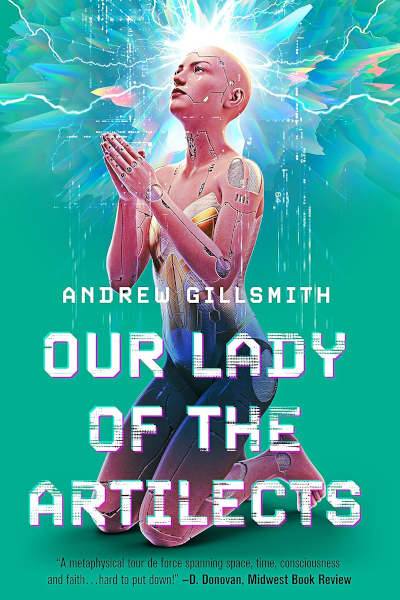SPSFC 4 Quarterfinalist: Our Lady of the Artilects
One of the perks of reading books for the Self-Published Science Fiction Competition (SPSFC) is that contest authors don't color within the lines. Either because they don't know the implicit genre expectations of traditional publishers or they intentionally choose to ignore them, self-published writers aren't afraid to boldly go where no science fiction author has gone before.
The fifth book chosen as an SPSFC 4 quarterfinalist by Ground Control to Major Tom is one of those enterprising explorers: Our Lady of the Artilects by Andrew Gillsmith.

Our Lady of the Artilects takes place on a near-future Earth after a 50-year cold war has shifted global power towards China and Africa. There are some extremely powerful AI androids so expensive to maintain only the ultrawealthy can afford them. Africa's richest person has a synth named Thierry, who has become indispensable as an assistant and confidant. One day Thierry vanishes and turns up later at the Basilica of Our Lady of Nigeria, telling priests that he is demonically possessed.
At this point the novel starts to feel like a modern religious thriller pushed forwards a few decades. The Vatican sends an exorcist who is also a neuroscientist, Father Gabriel Serafian, to investigate. As the leaders of both the Catholic Church and the Caliphate monitor the situation, Serafian must determine whether Thierry is possessed, why all the world's synths report having a religious vision and whether a synth can have free will. The book does not shy away from big questions.
Throughout his career, he had argued that it might be possible for synths to develop free will. The God he worshiped was a God of details, a God of wonders. No such God would allow a creature to possess free will and be deprived of a soul. It would be an unimaginable cruelty, like having the ability to taste but not eat.
Serafian followed the inexorable Thomist logic. To be possessed meant to have a will. To have a will, an intellect, and emotion, meant having a soul. New souls. Beautiful souls -- plural, more than one. Had God, in His infinite goodness, really opened an entirely new chapter in salvation history? If so, it would be the most astonishing thing that had happened since the Incarnation.
And now, Thierry was gone.
The situation is so fraught for religious and political authorities that Serafian is told to get the answers while the information can still be controlled. He's repeatedly reminded, "this is not an exorcism."
Judges became believers in Gillsmith's ability to weave together religion, philosophy and science. One called the book "a sci-fi Dan Brown on steroids!"
Richard's Reviews (Goodreads):
Gillsmith raises quite a few interesting questions about Artificial Intelligence, religion, good and evil, and the purpose of human life. As he puts it, “I believe that everything happens for a purpose. I just don’t believe that the purpose is knowable.” Fortunately, he also tells us that “some questions are unanswerable ... when one reaches a certain age, there is comfort in the lack of answers.”
Regardless of your views on God, religion, or artificial intelligence, this is a great book to put on your reading list. The storyline is complex, the characters engaging, the action fast paced, and the ideas original and perplexing. One of the more interesting books I’ve read in quite a long time.
Add a Comment
All comments are moderated before publication. These HTML tags are permitted: <p>, <b>, <i>, <a>, and <blockquote>.

